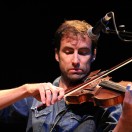
It’s quite impressive to watch Andrew Bird take a riff, hit a loop pedal, and add more layers until an entire piece of music is created.
At Spreckels Theatre on August 11, Bird did this with a variety of instruments, including guitars, drums, keys, and a xylophone. He played the evening’s first few songs in this manner, running around the stage hitting his loop pedal, switching between his signature violin, other instruments, and singing.
Before the audience knew that there was indeed a backing band, it seemed as if Bird might do his whole show this way. In fact, that’s one of the most impressive things about him: it’s totally plausible to think that he could pull it off and still sound better alone than most bands do together.
The first song Bird played with his band, “A Nervous Tic Motion of the Head to the Left,” found him behind the electric guitar. And that’s where he stayed for the entire song. It was nice to see him settle in and focus on the moment, instead of timing each instrument change just right. It worked so well. The western Gothic mood of the song saturated the theater and transported the crowd to a very different place.
As the set went on, Bird started to get pretty busy (at one point, he rotated between guitar, violin, and xylophone), but the quality of the songs never wavered. As much as Bird rotated instruments and treated each like he’d been born playing it, the music never seemed too busy or like the show was even about that. This show was about the songs, and Andrew Bird writes some of the best out there.
Andrew Bird makes the kind of music (like Van Morrison, M. Ward, or Iron and Wine) that you just want to crawl inside of and take a nice cozy nap in. His staples — whistling, virtuosic and creative violin playing, science geek imagery, and above all, a groovy sense of musical sophistication — all add up to an incredibly recognizable sound. Some people fault him for this; like filmmakers Wes Anderson and Terry Gilliam, the staples of Bird’s work are sometimes written off as gimmicks. But if there were any skeptics in the audience at Spreckels Theatre, they were silenced as each whistle and violin flourish filled a necessary space in the music.
Near the end of the evening, all four band members gathered around a single microphone and played a set of “old-timey” songs that included a Townes Van Zandt cover and a new track off of Bird’s upcoming record. The new song, “Three White Horses,” had a straightforward folk/country sound and there wasn’t a single whistle or violin to be heard. Between the new song and the rest of the old-timey portion of the show, I was left with the impression that the new album might be a departure from Bird’s signature sound. If it is, let’s hope it’s because he’s found a new muse — and not because he thinks he needs to appease his critics.
